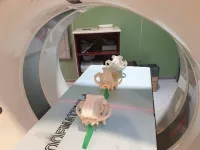(Press-News.org) Mohammad Atari and colleagues explore the promise and peril of using large language models (LLMs) in psychological research, beginning by urging researchers to also ask themselves whether and why they should use LLMs—not just how they should use them. The authors caution against using LLMs as a replacement for human participants, noting that LLMs cannot capture the substantial cross-cultural variation in cognition and moral judgement known to exist. Most LLMs have been trained on data primarily from WEIRD (Western, Educated, Industrialized, Rich, Democratic) sources, disproportionately in English. Additionally, although LLMs can produce a variety of responses to the same question, under this seeming variance is an algorithm that will produce the most statistically likely response most often and less likely responses at proportionately lower frequencies. Essentially, a LLM simulates a single “participant” rather than a group—a point the authors underline by showing a marked lack of variance when administering a broad range of self-report measures to LLMs. The authors also warn that LLMs are not a panacea for text analysis, especially where researchers are interested in implicit, emotional, moral, or context-dependent text. Additionally, the “black-box” nature of LLMs makes them unsuited to many research contexts and makes reproducing results impossible as the LLMs are updated and change. Finally, LLMs do not outperform older tools, such as small, fine-tuned language models on many tasks. The authors conclude that while LLMs can be useful in certain contexts, the hurried and unjustified application of LLMs for every possible task could put psychological research at risk at a time when the reproducibility crisis calls for careful attention to rigor and quality of research output.
END
Should AI be used in psychological research?
2024-07-16
ELSE PRESS RELEASES FROM THIS DATE:
AI makes human-like reasoning mistakes
2024-07-16
Large language models (LMs) can complete abstract reasoning tasks, but they are susceptible to many of the same types of mistakes made by humans. Andrew Lampinen, Ishita Dasgupta, and colleagues tested state-of-the-art LMs and humans on three kinds of reasoning tasks: natural language inference, judging the logical validity of syllogisms, and the Wason selection task. The authors found the LMs to be prone to similar content effects as humans. Both humans and LMs are more likely to mistakenly label an invalid argument as valid when the semantic content is sensical and believable. LMs are also just as bad as humans at the Wason selection task, in which the participant ...
Waterpower scarcity and coal use during the Industrial Revolution
2024-07-16
A study combining history, economics, and fluvial geomorphology examines the causes of the adoption of coal power during the Industrial Revolution in Great Britain. At the beginning of the mechanization of the textile industry in Britain, most machines were powered with waterpower. Eventually waterpower was replaced by using coal to make steam power and the causes of this shift have long been debated. One influential hypothesis has been that waterpower became scarce in the industrial heartland of northwest England during the early 19th century, as all available suitable sites were already fitted with ...
Capturing carbon with energy-efficient sodium carbonate−nanocarbon hybrid material
2024-07-16
Industrial emissions are one of the main sources of climate change-inducing carbon dioxide (CO2). While adopting renewable and clean energy alternatives is one option for mitigating these carbon emissions, carbon capture technology is another solution to control CO2 emissions. In big CO2-emitting industries, such as cement, oil refineries, and thermal power plants, carbon capture technology can be easily applied to remove CO2 emissions directly at the source at a feasible cost and with low energy consumption. Different materials have been explored for CO2 capture in factories, including zeolites, metal−organic frameworks, natural minerals, alkalis, ...
Digital dog and cat skull database
2024-07-16
The ELTE Eötvös Loránd University is home to the skulls of more than 150 dog breeds and other animals. To make this unique collection accessible to all, researchers digitised the skulls of 431 dogs, cats and wild relatives. The database can be used for educational and research purposes.
Tibor Csörgő, a researcher at ELTE, has been collecting animal skulls for decades to teach anatomy to biologists. The shape of the skull varies considerably between species and breeds, especially in dogs, where, for example, greyhounds have long skulls and the now popular French bulldogs have rounded skulls.
A skull biobank ...
Breaking through silicon
2024-07-16
Overcoming Historical Barriers
Silicon, the cornerstone of modern electronics, photovoltaics, and photonics, has traditionally been limited to surface-level nanofabrication due to the challenges posed by existing lithographic techniques. Available methods either fail to penetrate the wafer surface without causing alterations or are limited by the micron-scale resolution of laser lithography within Si. In the spirit of Richard Feynman's famous dictum, 'There's plenty of room at the bottom', ...
A new study finds that early detection of miRNAs in maternal blood may offer the potential for predicting preeclampsia
2024-07-16
Preeclampsia (PE) is a significant contributor to the increase in maternal morbidity and mortality worldwide, with particularly alarming numbers in the United States, where it affects about 2–8% of pregnancies, resulting in premature birth with associated morbidities for their infants as well. A new study by researchers at UCLA Health finds that early detection of specific microRNAs (miRNAs) packaged in vesicles may offer the opportunity to predict preeclampsia in pregnant people before clinical symptoms manifest.
The study, led by Dr. Sherin U. Devaskar, MD, executive chair of the Department of Pediatrics ...
Recycled micro-sized silicon anodes from photovoltaic waste improve lithium-ion battery performance
2024-07-16
Researchers from the Qingdao Institute of Bioenergy and Bioprocess Technology (QIBEBT) of the Chinese Academy of Sciences have developed low-cost micro-sized silicon anodes from recycled photovoltaic waste using a novel electrolyte design.
Their pioneering work, published in Nature Sustainability on July 16, offers a path to more sustainable, low-cost, and high-energy-density batteries that could transform energy storage systems for electric vehicles and renewable energy applications.
Silicon anodes are favored for their ability to substantially increase the energy density of lithium-ion batteries compared to traditional graphite anodes but are hindered by significant volume ...
Current international poverty line a ‘misleading shortcut method’, say experts
2024-07-16
Billions of dollars in foreign aid could be spent more effectively if international poverty statistics were more accurate, according to new research led by King's College London.
Dr Michail Moatsos, a research fellow in the Department of International Development, says current methods for calculating the international poverty line lead to a skewed picture of how poverty is distributed across the world – and this is hampering attempts to eradicate it.
“Currently, international donors cannot prioritise their funds based on the best possible information and therefore funnel those funds to those most in need around the world. A $2.15 per day poverty line affords very different ...
Food aroma study may help explain why meals taste bad in space
2024-07-16
Scientists from RMIT University have led a world-first study on common food aromas that may help explain why astronauts report that meals taste bland in space and struggle to eat their normal nutritional intake.
This research, which is published in the International Journal of Food Science and Technology, has broader implications for improving the diets of isolated people, including nursing home residents, by personalising aromas to enhance the flavour of their food.
Previous research has shown that aroma plays a big role in the flavour of food.
The team in this study tested how people perceived vanilla and almond extracts and lemon essential oil changed from normal environments on ...
Weather experts discover new effect of storm - in a teacup
2024-07-16
Britain, prepare for deep depression: storms ruin tea.
A new study reveals that Storm Ciaran cut an invisible path of mayhem across southern Britain last autumn, destroying any possibility that 20 million people could have a proper cup of tea at breakfast.
The storm's record-breaking low pressure meant the boiling point of water was below the crucial 100 degrees Celsius required for a decent cuppa, meteorologists at the University of Reading have discovered.
In a study published today [Tuesday, 16 July] in the journal Weather, the scientists reported that water in Reading was boiling at just 98°C.
During the storm on the morning of November 2, ...




